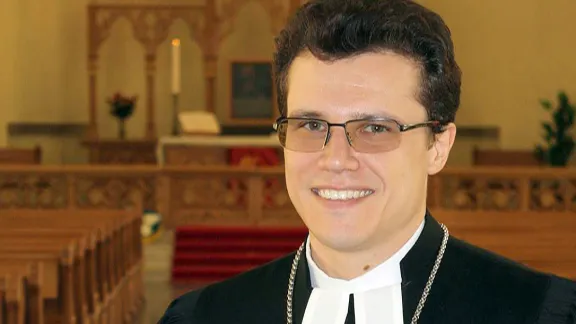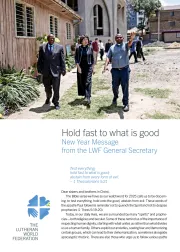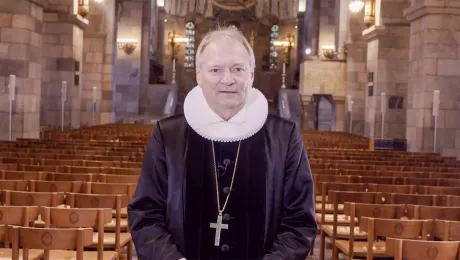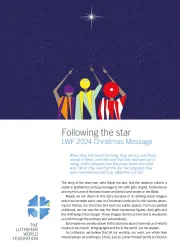
Archbishop Dietrich Brauer. Photo: ELCROS
Solidarity for Reconciliation and Peace in Ukraine
(LWI) – Archbishop Dietrich Brauer, recently consecrated as head of the Evangelical Lutheran Church in Russia (ELCR) says the archbishop’s role is critical in connecting two parts of a vast church with different traditions, history and spirituality.
Speaking to Lutheran World Information (LWI) following his consecration on 8 February in Moscow, Brauer affirmed his commitment to continue fostering unity within ELCR, which is made up of two regional churches—the Evangelical Lutheran Church in European Russia (ELCER) and the Evangelical Lutheran Church in the Urals, Siberia and the Far East (ELKUSFO).
“Despite differences, we are united by our common history and the church structure,” he said. “In this respect, the archbishop is an important figure, who connects both parts and makes an important contribution in the unity of the church,” Brauer added.
Brauer was elected as ELCR archbishop at the church’s synod last September, and was until then, ELCER bishop and interim archbishop of the Russian Lutheran church, which has congregations spread out between Moscow and Vladivostok. He succeeds retired Archbishop August Kruse.
Relations with Neighboring Church in Ukraine
The new archbishop also reflected on relations with the neighboring sister church, the German Evangelical Lutheran Church in Ukraine (GELCU), especially in the midst of the current violent political struggle in Ukraine involving pro-Russian militia.
“The Evangelical Lutheran Church in Russia has always tried to support sisterly contacts with the German Evangelical Lutheran Church in Ukraine,” said Brauer. He noted that this year’s 6 March World Day of Prayer services in Lutheran churches in Russia will include prayers for peace and reconciliation with Ukraine. Plans are under way to resume in 2016 full-time theological education at the ELCR Theological Seminary in St Petersburg, and Ukrainian students will be invited to take part, he noted.
Following the 2014 referendum that rendered Crimea to the Russian Federation, seven Lutheran congregations in Crimea were advised by the Bishops’ Council of the Federation of the Evangelical Lutheran Churches in Russia and Other States (ELCROS) that they could remain under the jurisdiction of the Ukrainian church. In spite of the political changes, internal decisions on belonging to one of the Lutheran churches “will be made by the congregations of Crimea independently and on their own,” the archbishop added.
The ELCROS Federation groups together the ELCR, ELKUSFO and other regional Lutheran churches in Belarus, Georgia, Kazakhstan, Kyrgyzstan, Ukraine and Uzbekistan.
Lutheran Witness in Russian Society
On Lutheran church witness in Russian society today, Brauer said ELCR’s ecumenical engagement with the Russian Orthodox Church on one hand, and with other Protestant movements on the other, are important contributions. It is also a “church of modern theology,” as it increasingly works to make Lutheran theology accessible to people in the local language. “Our local theologians are publishing books in Russian and translating works by German Lutheran theologians,” he added. The church also organizes theological seminars and runs a radio program on Lutheran theology.
The ELCR is a visible church in the country’s cultural life, Brauer explained. “It is a place to develop church music and culture: in all cities where we have historical buildings and organs, we offer church music concerts. This is a huge contribution to the cultural life of Russia,” he added.
Lutheran Communion Accompaniment
The Lutheran World Federation (LWF) was represented at Brauer’s consecration by the Vice-President for Central Eastern Europe Bishop Dr Tamás Fabiny (Hungary), who delivered a congratulatory letter from LWF General Secretary Rev. Martin Junge.
The general secretary assured Brauer of the Lutheran communion’s accompaniment and support as he assumes his new role of leading the largest LWF member church in geographical expansion. “Your duties as bishop of European Russia are diverse and challenging,” Junge wrote to Brauer. “The expectations of an archbishop and his presence in the midst of these immense distances are great,” he added.
Church leaders from ELCROS and other churches throughout Europe, as well as Russian government officials attended Brauer’s consecration at St Peter’s and St Paul’s Evangelical Lutheran Cathedral in the Russian capital.
ELCROS joined the LWF in 1989. Its regional churches comprise around 450 congregations with over 70,000 Lutherans.


